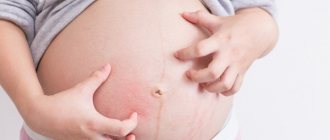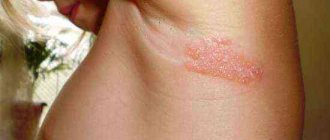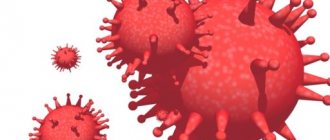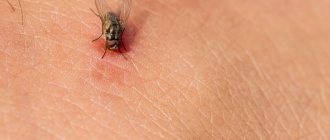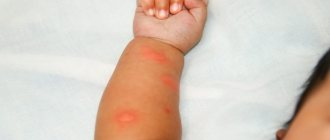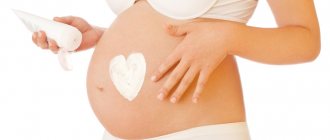Allergies during pregnancy: the effect of allergies on the fetus
25.05.2021
Epidemiological data show that 15-30% of women of childbearing age suffer from allergic diseases. Allergies often worsen during pregnancy and can complicate pregnancy.
Allergies during pregnancy
Allergies can be a group of disease symptoms caused by contact with environmental factors that do not cause allergic reactions . Exposure to external factors, called allergens , activates the immune mechanisms of the allergic person. After this, the immune system begins to stimulate the body's cells to release various substances that cause inflammation.
Allergens can be divided into:
- inhaled;
- food;
- contact.
Depending on which allergen is the source of sensitization, different symptoms will appear. Inhaled allergens mainly cause respiratory diseases, and contact allergens cause skin reactions.
Allergies may worsen during pregnancy . This mainly applies to allergic rhinitis and asthma . Moreover, some allergic diseases appear for the first time during pregnancy . One of them is atopic dermatitis , which is the most common dermatosis among pregnant women.
The effect of allergies on the fetus
Allergies can negatively affect fetal development.
The following allergic diseases can affect the course and outcome of pregnancy:
- asthma;
- allergic rhinitis;
- conjunctivitis;
- hives;
- anaphylaxis;
- food allergy;
- drug allergy .
Women with asthma are primarily at increased risk of complications during pregnancy and childbirth . Experts estimate that up to 10% of pregnant women suffer from asthma . Research into asthma during pregnancy suggests it can slow down a baby's development. It can also lead to premature birth and low birth weight of the fetus. Because of the above complications, pharmacotherapy during pregnancy will be much less of a threat to the fetus than untreated asthma .
Allergy medications during pregnancy
During pregnancy , many changes occur in a woman's body. They concern almost all systems, especially the cardiovascular, respiratory, urinary, digestive and endocrine systems. The body of a pregnant woman is preparing to create appropriate conditions for the development of the fetus.
Due to changes in the functions of many organs and direct effects on the fetus, a pregnant woman needs to be especially careful when taking medications. Moreover, the annotations of most medications indicate that they are contraindicated in pregnant women.
Most allergic diseases are treated with antihistamines, which block the physiological effects of histamine. Histamine is the main mediator of allergic reactions . Antihistamines that are safe for pregnant women include: cetirizine, loratadine, clemastine, cyproheptadine and diphenhydramine.
Pregnant women should absolutely not take:
- antazolines;
- fexofenadine;
- hydroxyzine;
- promethazine;
- ketotifen;
- Levoceterizine.
Women with asthma may take bronchodilators and anti-inflammatory drugs during pregnancy Safe drugs include sympathomimetics - mainly salbutamol, fenoterol, formoterol, terbutaline and inhaled glucocorticosteroids: budesonide and beclomethasone. Oral corticosteroids are not recommended during pregnancy .
In the case of allergic rhinitis , in addition to antihistamines, pregnant women can use nasal corticosteroids, mainly budesonide, and, if necessary, beclomethasone and fluticasone, since there are still no studies confirming their harm during pregnancy .
For atopic dermatitis during pregnancy , topical emollients and antipruritic drugs are recommended. If their use does not bring improvement, general therapy with antihistamines is prescribed.
Home remedies for allergies during pregnancy
In addition to pharmacological agents, pregnant women with allergic rhinitis can use inhalations with sea water or 0.9% saline solution. There are many herbs that help relieve skin and intestinal allergy , but a pregnant woman should consult her doctor .
Published in Allergology Premium Clinic
Localization of rashes
During pregnancy, acne is localized mainly on the face. Sometimes a woman considers heavy rashes to be the first sign of conception, since they appear even before the delay. Acne in pregnant women appears in different places:
- On the neck, chest. The cause is mainly hormonal imbalance. In hot weather, acne activation is caused by dust and increased sweating.
- On the back. With excessive sweating, wearing synthetic clothing, liver diseases.
- On the stomach and buttocks. With a lack of air flow, hypothermia.
Acne is most often observed on the forehead and chin. In addition to the above, the following factors can also provoke it:
- frequent touching of the face with hands;
- habit of resting your chin;
- wearing synthetic hats;
- long bangs.
What is renal eclampsia
Renal eclampsia is a serious condition, the characteristic manifestations of which are seizures, surges in blood pressure and severe changes in the body. Renal eclampsia develops against the background of acute nephritis and nephropathy in pregnancy. Most often, the pathology is associated with increased blood viscosity and a large number of blood clots. Blood flow is disrupted both in the brain and in vital organs (liver, kidneys).
What is renal eclampsia - the main symptoms: severe headaches, vomiting, fainting, speech and vision impairment, reversible paresis, blood pressure surges, intermittent breathing, pale skin.
Will my breasts continue to grow?
Yes, breasts grow at the same intensity in the second trimester due to an increase in the volume of the mammary glands and fat deposition. It is these changes that prepare the expectant mother for feeding her baby.
The skin on and around the nipples will become darker. A woman may notice the appearance of peculiar tubercles around her nipples. These are glands that secrete a special substance that prevents the skin of the nipples from drying out.
A yellowish liquid may also begin to be released - an intermediate form of milk (colostrum), which plays an important role in the first days of the baby’s life. Having a laxative property, colostrum helps the newborn get rid of meconium (original feces), which consists of epithelial cells, prenatal hair, mucus, amniotic fluid, bile and water digested in the prenatal period.
Acne
Acne is a very common problem among expectant mothers. The appearance of acne on the skin is promoted by:
- Hormonal changes. The face and even the body can be sprinkled already in the first trimester of pregnancy due to increased synthesis of progesterone.
- Nervous feelings.
- Inadequate nutrition and dehydration.
- Improper skin care.
- Lack of fresh air.
- Increased sweating.
Acne during pregnancy most often appears in the first and second trimester. They are usually localized on the cheeks, neck, and décolleté. Acne rarely occurs on the back and forehead. To cope with this problem, expectant mothers are strongly advised to take good care of their skin. And under no circumstances should you try to get rid of acne by mechanical squeezing - this can lead to infection and serious complications.
As a rule, acne during pregnancy does not pose any threat to the expectant mother and her child. But if the rash becomes widespread, you cannot do without consulting a doctor.
Psoriasis
Psoriasis is a chronic skin disease that may well first appear during pregnancy. Typical for him:
- The appearance of lesions on the extensor surfaces of the limbs, sacrum and buttocks. The disease may also manifest itself in other parts of the body.
- The appearance of a rash in the form of plaques - areas that rise above the surface of the skin. Such affected areas are covered with thick, silvery, shiny scales. They come off easily, leaving behind a wet, bleeding surface.
- The occurrence of severe itching.
It is believed that psoriasis is not dangerous for pregnant women and does not pose any threat to the health and life of the fetus. But most medications used to treat this disease are strictly contraindicated for expectant mothers.
Diagnosis of the causes of gestosis
To make a diagnosis and assess the degree of a pregnant woman’s condition, the following studies are extremely important:
- regular blood pressure measurement;
- blood test for hemoglobin, platelets and hematocrit;
- blood clotting test;
- blood biochemistry, coagulogram;
- Fetal ultrasound;
- Fetal CTG;
- Dopplerometry of the vessels of the fetus, placenta and uterus.
You will find more information on our website. By calling or filling out an application on the website, you can make an appointment with a doctor who will talk about diagnosing the causes of gestosis and methods of prevention.
Systemic infectious diseases
There are quite a few infectious diseases that can manifest as skin rashes:
- Chickenpox. With this disease, the rash initially looks like small reddish spots and nodules, but soon becomes blisters filled with liquid. At first, the rashes appear on the scalp, then spread down to the entire body.
- Measles. With this disease, the rash is small, nodular and red, and occurs against the background of unchanged skin. It first appears on the face, then descends to the torso, and then to the limbs. Rashes appear on the 3rd-4th day of the disease.
- Rubella. With such an illness, a rash appears already on the first day of the development of the disease. It is small-spotted, pale pink, located on unchanged skin. At first, the rash appears on the face, then moves down to the torso and limbs. Rubella is extremely dangerous for pregnant women, as it can cause serious malformations in the fetus and even lead to its death.
- Scarlet fever. With this disease, the rash looks bright red and spotty. It appears on the 1st - 2nd day of the disease, is initially localized on the face (except for the area of the nasolabial triangle), then descends to the neck and torso, and then covers the flexion surfaces and natural folds of the skin.
Infectious diseases during pregnancy can be very dangerous. Such illnesses are usually accompanied by fever and symptoms of intoxication; they require immediate medical attention.
Treatment
In each individual case, the doctor selects an individual treatment regimen, taking into account the woman’s condition, her age and clinical manifestations.
Therapy for edema: a protein-rich and vitamin-rich diet with limited fluid and salt is prescribed. For edema, the permissible dose of fluid is 800-1000 ml per day.
Prescriptions for impaired renal function - taking diuretics under the supervision of a doctor.
To relieve spasms, the doctor will recommend sedatives (valerian, motherwort) and special medications.
When blood thickens, blood thinners are prescribed.
Treatment of gestosis in the 3rd trimester is carried out under the strict supervision of a doctor.
In what cases is hospitalization necessary:
- blood pressure readings are above 140/90;
- “floaters before the eyes”, dizziness;
- nausea, vomiting;
- pain in the upper abdomen;
- protein in urine is higher than 0.3 g/l;
- sudden weight gain.
Complex therapy in a hospital setting - normalization of blood pressure, improvement of blood supply to the placenta and uterus, relieving spasms.

